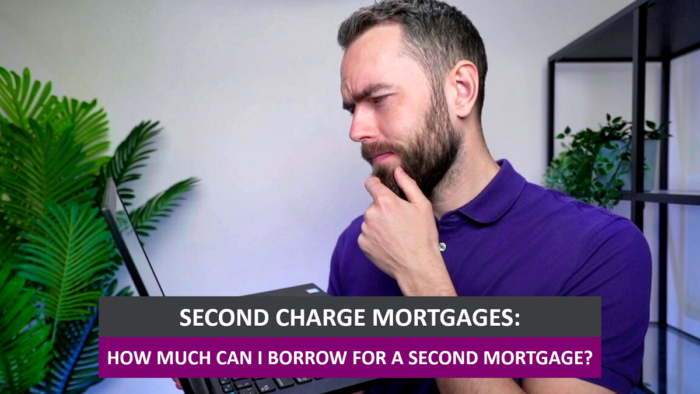How Much You Can Borrow for a Second Mortgage: Explained
Representative example: If you borrow £34,000 over 15 years at a rate of 8.26% variable, you will pay 180 instalments of £370.70 per month and a total amount payable of £66,726.00. This includes the net loan, interest of £28,531.00, a broker fee of £3,400 and a lender fee of £795. The overall cost for comparison is 10.8% APRC variable. Typical 10.8% APRC variable

Representative example: If you borrow £34,000 over 15 years at a rate of 8.26% variable, you will pay 180 instalments of £370.70 per month and a total amount payable of £66,726.00. This includes the net loan, interest of £28,531.00, a broker fee of £3,400 and a lender fee of £795. The overall cost for comparison is 10.8% APRC variable. Typical 10.8% APRC variable
Are you thinking about getting a second mortgage and wondering how much you can borrow? Don’t worry, you’re not alone. Each month, more than 6,900 people visit our website for advice on secured loans.
In this simple guide, we’ll explore:
- What a second charge mortgage is.
- Why people take out a second mortgage.
- The good and bad points of a second charge mortgage.
- Who can get a second charge mortgage.
- How much you can borrow for a second mortgage in 2023.
Did you know that in May 2022, over 2,800 homeowners took out second charge mortgages, marking a significant 43% increase from May 2021?1
Making such a decision is crucial, and we’re here to provide you with the necessary information.
Why take out a second loan?
Taking out a second mortgage will provide you with a loan that can be used as you wish.
There are no restrictions on what you use the money for, but many people choose to use it for similar expenses.
The two most common reasons to get a second mortgage are to pay for home improvements and renovations or to consolidate debts and save some money.
Other reasons someone may use a second charge mortgage are:
- To help buy a second home or holiday home by using the funds as a deposit
- To help family members buy a home (see above)
- To help buy a buy-to-let investment property
- Pay for private education or university costs
- Pay for private medical bill
- Buy expensive cars or go on memorable holidays
Second Charge vs Remortgage
If you’re exploring financial options, you’ve likely considered a remortgage. Let’s see how it compares with a second charge mortgage.
If you want to learn more about the types of secured loans, be sure to read our specialized guide.
| Factors | Second Charge Mortgage | Remortgage |
|---|---|---|
| Ease of Approval | Varies, but generally easier for those with existing mortgages | Depends on current financial status and may be easier for those with good credit history |
| Risk | Higher, as it is secured against home equity | Varies, can be lower if it consolidates debt or secures a better rate |
| Likely Costs | Potentially higher due to additional fees and higher rates | Varies, can be lower if securing a better interest rate |
| Interest Rates |
Typically higher than standard mortgages | Depends on credit score, can be lower for good credit |
| Eligibility Criteria | Less stringent, designed for individuals with adverse credit history | More stringent, based on current financial stability and credit history |
| Equity Requirement | Requires sufficient equity in the property | Requires equity, but usually involves replacing the existing mortgage |
| Impact on Credit Score | Can improve if managed well, but risky if defaults occur | Generally positive if managed well and debts are consolidated |
Eligibility
To be eligible for a second mortgage you will first need to have amassed enough home equity to take out the second charge mortgage.
Some lenders require the homeowner to take out a second mortgage of a minimum amount, meaning you’ll need to have more home equity than that amount for it to be possible.
You’ll also need to be a UK resident to access these types of mortgages.
That’s the basic eligibility covered, but to be approved you’ll need to prove you can afford the monthly repayments.
This means revealing details of your personal finances, not limited to your income and other debts.
The lender will calculate how much of your income will be needed to pay all your existing debts such as a first mortgage, as well as the proposed second charge mortgage.
Your credit score will also be assessed to see how you manage your debt repayments.
» TAKE ACTION NOW: Compare deals from the UK’s leading lenders
How much can I borrow to buy a second home?
If you are thinking about buying a second home as a buy-to-let investment or as a holiday home, you may also be wondering how much you can borrow on a second mortgage.
But this is a different situation from what was described above.
You may be wondering how much you will be able to borrow within a second mortgage to buy a second home while you are still paying back your first mortgage on your first property.
First, you need to make sure you have a big enough deposit to buy the second home.
Most lenders will require you to make a downpayment of at least 20% of the second home’s value in cash. If you are looking for a buy-to-let investment and are going to need a buy-to-let mortgage, then you usually need a larger deposit due to increased risk.
You might need as much as 40% of the property value upfront.
The mortgage lender will then need to assess if the new mortgage would be affordable.
Affordability checks are made by assessing your income against your debt, also known as your debt to income ratio. You will need to prove that you can afford the mortgage on a second property while also paying your current mortgage on your first home – and any other credit card or loan debts.
There are no stringent rules that every lender must follow.
However, to take out a second mortgage on a second home successfully, you will probably need your total debt to be around 40% of your income or lower, including interest payments.
Lender |
APRC |
Monthly payment |
Total amount repayable |
|---|---|---|---|
| United Trust Bank Ltd | 5.84% |
£218.47 |
£26,216.67 |
| Selina | 6.34% |
£219.34 |
£26,320.83 |
| Equifinance | 6.59% |
£219.77 |
£26,372.92 |
| Pepper Money | 6.86% |
£220.24 |
£26,429.17 |
| Together | 7.4% |
£221.18 |
£26,541.67 |
| Norton | 9.05% |
£224.05 |
£26,885.42 |
| Masthaven | 9.65% |
£225.09 |
£27,010.42 |
| Loan Logics | 11.2% |
£227.78 |
£27,333.33 |
| Evolution | 11.28% |
£227.92 |
£27,350.00 |
Representative example: If you borrow £34,000 over 15 years at a rate of 8.26% variable, you will pay 180 instalments of £370.70 per month and a total amount payable of £66,726.00. This includes the net loan, interest of £28,531.00, a broker fee of £3,400 and a lender fee of £795. The overall cost for comparison is 10.8% APRC variable. Typical 10.8% APRC variable.
Search powered by our partners at LoansWarehouse.
Maximum loan amount
Second charge mortgage providers do not allow you to borrow against all of your home equity.
To protect themselves from overborrowing without sufficient collateral, and to protect you from a situation of negative equity (if your home value decreases), they cap the amount of equity you can borrow against.
The cap is usually between 80-85% with most lenders, but there might be a few exceptions.
For example, if you had £150,000 home equity after years of mortgage repayments, a second charge mortgage with an 80% LTV would allow you to borrow £120,000 maximum.
However, this is only the case if you qualify for the maximum amount.
If your finances aren’t ideal or you have a low credit score, you could not be eligible for the lender’s highest loan to value ratio and may not be able to borrow against more of your home equity.
What is a mortgage calculator?
Mortgage lenders often include mortgage calculators within their website pages to help homebuyers work out what they would be required to pay by taking out a mortgage with them.
It also helps them to compare against other mortgage deals elsewhere.
Recently, more lenders have provided these types of mortgage calculators for people looking to purchase a second home.
The calculator includes a function so the potential buyer can input their existing debts, such as their monthly first mortgage payments. It also uses this information to determine what size of second mortgage they can get.
These calculators are not as accessible as standard mortgage calculators but they do exist.
Just remember that they are based on representative APR only and you may not be offered the deal suggested within any calculation. Just like any financial calculator.
Second charge mortgage for all purposes
- Stuck paying high interest on credit card debts & loans?
- Looking to fund a home improvement project?
- Dreaming of finally taking the once-in-a-lifetime trip?

Polly
“This was by far possibly one of the nicest experiences I’ve had getting a secured loan.”
Reviews shown are for Loans Warehouse. Search powered by Loans Warehouse.
Can I afford it?
It is your debt to income ratio that determines if you can afford to get a second charge mortgage with an existing mortgage.
The mortgage provider will need to complete affordability checks that compare how much you earn against your essential debt expenses, such as your existing mortgage and any other debt repayments you have agreed to.
It’s not just about making sure your debts are less than your total income because your income also has to pay for everyday bills and living expenses.
Your total debts should be less than 40% of your income, and even some lenders would consider this as too high.
There’s no fixed percentage your debt payments must be less than relative to income, but the lower the percentage the greater the chance of being judged to afford the second charge mortgage.
You may believe you can afford it, but you have to convince a lender which uses statistics rather than promises to eat out less and to stop buying expensive coffees on your way to work.
Can I use it as a second home deposit?
Some people borrow against the equity in their home to help fund a second home purchase.
They use the loan to contribute to the down payment of the second property. This can work, but the second charge mortgage will also be considered as a debt relative to their income.
If the debt to income ratio is too high because of the second charge mortgage then the individual could be rejected for a mortgage to buy the second home.

